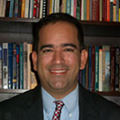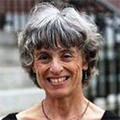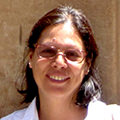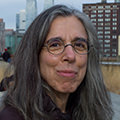
David Brotherton
Professor and Chair of Sociology, John Jay College of Criminal Justice
David Brotherton obtained his Ph.D. in Sociology in 1992 at the University of California, Santa Barbara while teaching public high school in San Francisco. He began work on street gang subcultures at U.C. Berkeley in the same year. In 1994, Dr. Brotherton came to John Jay College of Criminal Justice where he continued his research on youth resistance, marginalization, and deportation co-founding the Street Organization Project with Luis Barrios in 1997. He edits the Public Criminology book series at Columbia University Press. In 2003 and 2004 Dr. Brotherton co-organized the first academic conferences on deportation in the Caribbean and the United States respectively. In 2011 he was named Critical Criminologist of the Year and his work has been nominated for the George Orwell Prize in England and the C.Wright Mills Award in the United States. Among his recent books, published by Columbia University Press, are: Banished to the Homeland: Dominican Deportees and Their Stories of Exile, with Luis Barrios (2011); Keeping Out The Other: A Critical Introduction to Immigration Control, edited with P. Kretsedemas (2009); and The Almighty Latin King and Queen Nation: Street Politics and the Transformation of a New York City Gang, with Luis Barrios (2004). Dr. Brotherton’s current projects include a new work for Routledge called “The Youth Street Gang,” and is collecting data on the performance of vindictiveness in deportation hearings.

Hester Eisenstein
Professor of Sociology and Women’s Studies, Queens College and The Graduate Center
Hester Eisenstein is a native New Yorker. After getting her Ph.D. in French history from Yale University, she taught at Yale, at Barnard College (Columbia University), where she was active in the formation of the Women’s Studies Program and the Scholar and Feminist conference series, and at the State University of New York at Buffalo. In the 1980s she served as a “femocrat” (feminist bureaucrat) in the state government of New South Wales, Sydney, Australia. Since 1996 Eisenstein has been a professor of sociology and women’s studies at Queens College and the Graduate Center, The City University of New York. Her books include Contemporary Feminist Thought (1983); Inside Agitators: Australian Femocrats and the State (1996); and Feminism Seduced: How Global Elites Use Women's Labor and Ideas to Exploit the World (2009). Eisenstein was the Director of the Women's Studies Program at Queens from 1996 to 2000, and is currently vice-chair of the Queens College chapter of the Professional Staff Congress-CUNY, the faculty and staff union for the City University of New York. She is also on the editorial board of Socialism and Democracy.

Joshua Freeman
Distinguished Professor of History, Queens College and the Graduate Center
Joshua B. Freeman’s books include American Empire, 1945-2000: The Rise of a Global Power, the Democratic Revolution at Home; Working-Class New York: Life and Labor since World War II; and In Transit: The Transport Workers Union in New York City, 1933-1966. He is currently working on a transnational history of very large factories and their cultural significance. He has received the Philip Taft Labor History Book Award, the New York Society Library Book Prize, the John Commerford Labor Education Award, and fellowships from the American Council of Learned Societies and the National Endowment for the Humanities. He received a Ph.D. in History from Rutgers University in 1983.

Ismael García-Colón
Associate Professor of Anthropology, Sociology, and Social Work, College of Staten Island
Ismael García Colón is a historical and political anthropologist with interests in political economy, migration, and Caribbean, Latin American and Latina/o studies. García Colón is the author of Land Reform in Puerto Rico: Modernizing the Colonial State, 1941-1969 (University Press of Florida, 2009). His publications have also appeared in Latin American Perspectives, CENTRO Journal, and Latino Studies. His research explores how development policies formed and transformed modern subjectivities in Puerto Rico during the mid-twentieth century. He is currently writing a book on the Puerto Rican experience in U.S. farm labor and its relation to the formation of the colonial state in Puerto Rico, the political economy of agriculture, and the discourses and practices of deportation and citizenship.

Kwasi Konadu
Professor of History,Borough of Manhattan Community College
Kwasi Konadu has conducted extensive archival and field research in West Africa, Europe, Brazil, the Caribbean basin, and North America, and much of his writings focus on African and African diasporic history. He is the author of Indigenous Medicine and Knowledge in African Society (Routledge, 2007), A View from the East: Education and Black Cultural Nationalism in New York City (Syracuse Univ. Press, 2009), The Akan Diaspora in the Americas (Oxford Univ. Press, 2010), The Akan People: A Documentary Reader, 2 vols. (Markus Wiener Publishers, 2013), Transatlantic Africa, 1440-1880 (Oxford Univ. Press, 2014), and (with Clifford Campbell) The Ghana Reader: History, Culture, Politics (Duke Univ. Press, 2014). Dr. Konadu is currently writing a history of diaspora and settlement in the Gold Coast/Ghana, a history of slavery and spirituality in Atlantic Africa, and a world history that focuses on the challenge of human co-existence. Dr. Konadu is also the founding director of the nonprofit publishing group, Diasporic Africa Press, Inc.

Nicole Marwell
Associate Professor of Public Affairs and Sociology, Baruch College and the Graduate Center
Nicole Marwell is the Academic Director of the Baruch College Center for Nonprofit Strategy and Management. Marwell has published articles in the American Sociological Review, the Annals of the American Society of Political and Social Sciences, City and Community, Social Service Review, Qualitative Sociology, and the Nonprofit and Voluntary Sector Quarterly. Her 2007 book, Bargaining for Brooklyn: Community Organizations in the Entrepreneurial City was published by the University of Chicago Press. Current empirical work examines: government contracts to nonprofit organizations in New York City; collaborative governance and the social rights of children in the child welfare system; and dynamics of patronage and political exchange in discretionary public budget allocations. Marwell’s research is supported by the National Science Foundation.

Ruth Milkman
Professor of Sociology, Graduate Center
Ruth Milkman is a sociologist of labor and labor movements who has written on a variety of topics involving work and organized labor in the United States, past and present. She has written extensively about low-wage immigrant workers in the U.S., analyzing their employment conditions as well as the dynamics of immigrant labor organizing. She helped lead a multi-city team that produced a widely publicized 2009 study documenting the prevalence of wage theft and violations of other workplace laws in Los Angeles, Chicago and New York. She also recently co-authored a study of California’s paid family leave program, focusing on its impact on employers and workers. After 21 years as a sociology professor at UCLA, where she directed the Institute for Research on Labor and Employment from 2001 to 2008, she returned to New York City in 2010. She is currently a Professor of Sociology at the CUNY Graduate Center and at the Joseph F. Murphy Institute for Worker Education and Labor Studies, where she also serves as Academic Director.

Celina Su
Associate Professor of Political Science, Brooklyn College
Celina Su’s work focuses on how everyday citizens engage in policy-making. Her publications include Streetwise for Book Smarts: Grassroots Organizing and Education Reform in the Bronx (2009), Our Schools Suck: Young People Talk Back to a Segregated Nation on the Failures of Urban Education (co-authored, 2009), and Introducing Global Health: Practice, Policy, and Solutions (co-authored, 2013). Her honors include a Berlin Prize and a Whiting Award for Excellence in Teaching. She co-founded Kwah Dao/ the Burmese Refugee Project in 2001 and has served on New York City's participatory budgeting Steering Committee since 2011. Her most recent projects focus on models of critical pedagogy and performative politics in youth empowerment, and in participatory community development overall. She earned her Ph.D. from MIT in 2005.

Patricia Tovar
Professor of Anthropology, John Jay College of Criminal Justice
Patricia Tovar’s research interests have focused on the study of gender and war, widowhood, forced displacement, violence, sexual and reproductive health, and gender and science. She has written extensively on the consequences of armed conflict in women’s lives, the impact of new reproductive technologies for women, the construction of medical discourses and cosmetic alterations of the female body, and on why women lag far behind men in science and technology. Some of her publications are: The widows of the Armed Conflict in Colombia, and Family, Gender and Anthropology. Her current project focuses on the role of women in the Age of Discovery. It examines the movement of women, their contribution to cultural exchange, the opening of trade routes, the Spanish crown policies about women and the family, sexuality, religion, and human rights issues. She received a Ph.D. in anthropology from the CUNY Graduate Center in 1996.

Sharon Zukin
Professor of Sociology, Brooklyn College
Sharon Zukin is professor of sociology at Brooklyn College and the Graduate Center, CUNY. She writes about cities, culture, and the creative economy, and is now editing a book on local shopping streets in six global cities from New York to Shanghai. She is the author of Naked City: The Death and Life of Authentic Urban Places (2010), which won the Jane Jacobs Award for Urban Communication, and Landscapes of Power: From Detroit to Disney World (1991), winner of the C. Wright Mills Award, as well as Loft Living (3rd edition, 2014) and other books about New York and other cities. She holds a PhD from Columbia University.


